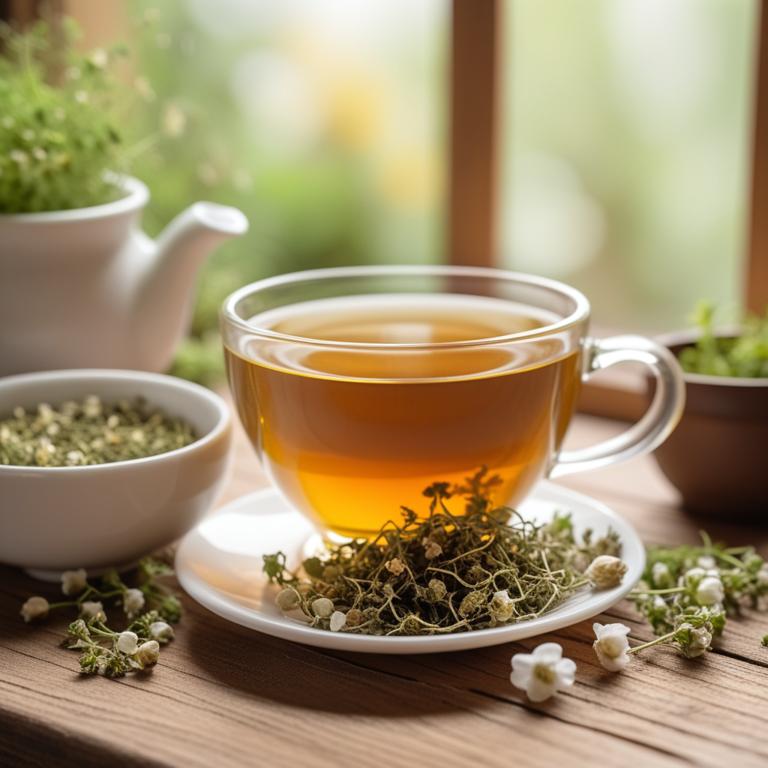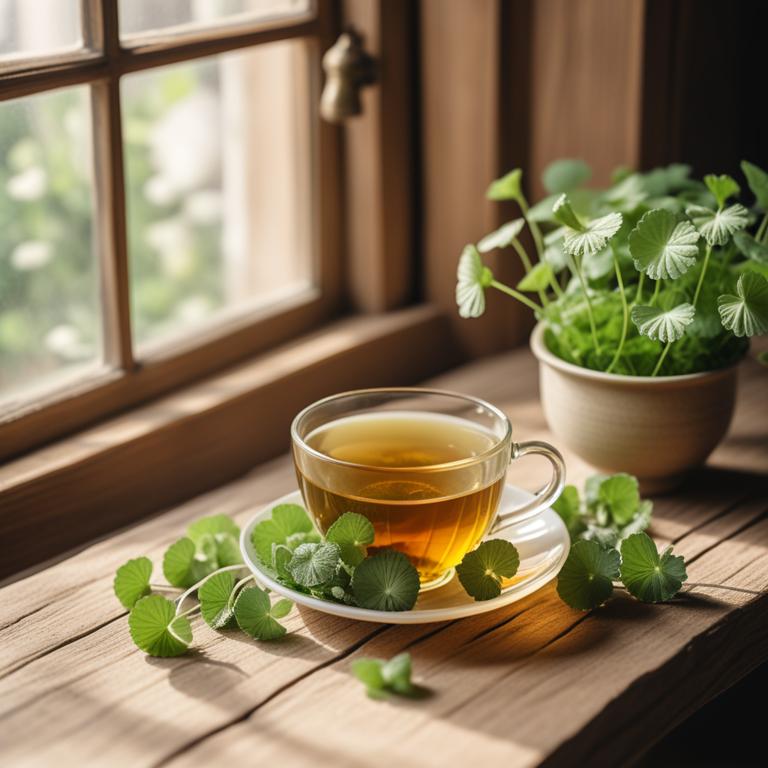8 Herbal Teas For Brain Fog

Herbal teas can be a great way to tackle brain fog, a common feeling of being mentally sluggish and unfocused.
Brain fog can be caused by stress, lack of sleep, or certain health conditions, but herbal teas can help alleviate its symptoms. Let's take a look at three herbs that have been used for centuries to support brain health: Ginkgo biloba, Bacopa monnieri, and Panax ginseng. Ginkgo biloba, for example, is known for its ability to improve blood flow to the brain, which can help increase oxygen supply and reduce brain fog. This can lead to better concentration and memory, making it easier to stay focused on tasks. Bacopa monnieri, on the other hand, has been shown to enhance cognitive function and memory, particularly in older adults.
It's thought to work by reducing inflammation in the brain and supporting the growth of new neurons. Panax ginseng is another popular herb for brain health, as it's believed to improve mental clarity and reduce fatigue. It's thought to work by stimulating the brain's neurotransmitters, which can help improve mood and reduce stress. Drinking these herbal teas can have a significant impact on your daily life, allowing you to tackle tasks with more energy and clarity. By incorporating them into your routine, you may find that you're able to stay focused for longer periods of time, and that your memory and cognitive function improve. Herbal teas like these can be a natural and effective way to support brain health, without the need for prescription medications.
They can be enjoyed hot or cold, and often come in a variety of flavors, making them easy to incorporate into your daily routine.
- 1. Ginkgo biloba
- 2. Bacopa monnieri
- 3. Panax ginseng
- 4. Centella asiatica
- 5. Zingiber officinale
- 6. Melissa officinalis
- 7. Avena sativa
- 8. Valeriana officinalis
1. Ginkgo biloba

Ginkgo biloba teas contains flavonoids and bilobalide, which are the active constituents that help improve brain function.
Flavonoids have antioxidant properties that protect the brain from oxidative stress, which can cause brain fog. Bilobalide increases blood flow to the brain, improving cognitive function and reducing symptoms of brain fog. This increased blood flow also helps to improve memory and concentration.
By improving blood flow and reducing oxidative stress, Ginkgo biloba teas can help alleviate brain fog and improve overall brain function.
- Gather 1 cup of boiling water and 1 teaspoon of dried Ginkgo biloba leaves.
- Measure 1 teaspoon of loose-leaf Ginkgo biloba and place it in a tea infuser or a small muslin bag.
- Steep the Ginkgo biloba in the boiling water for 5-7 minutes.
- Strain the tea into a cup and discard the leaves.
- Drink the tea immediately and consider adding honey or lemon for taste.
2. Bacopa monnieri

Bacopa monnieri teas contains a number of bioactive constituents that help improve mental clarity and focus.
Bacosides, a group of saponin compounds, are the main active ingredients responsible for this effect. These compounds work by enhancing the communication between brain cells, improving memory and cognitive function. The antioxidant properties of bacosides also help protect the brain from damage caused by free radicals, further contributing to improved mental clarity.
By promoting a healthy brain environment, Bacopa monnieri teas may help alleviate brain fog and support overall brain function.
- Gather 1 teaspoon of dried Bacopa monnieri leaves and 1 cup of boiling water.
- Add the Bacopa monnieri leaves to a tea infuser or a small strainer.
- Pour the boiling water over the leaves and let it steep for 5-7 minutes.
- Strain the tea into a cup and discard the leaves.
- Drink the tea 1-2 times a day, ideally in the morning and before bedtime, to help with brain fog.
3. Panax ginseng

Panax ginseng teas contains bioactive constituents like ginsenosides and ginsenolic acids.
These compounds have antioxidant and anti-inflammatory properties, which help protect the brain from oxidative stress and inflammation. Ginsenosides, in particular, have been shown to improve blood flow to the brain, boost cognitive function, and enhance memory. The antioxidant properties of ginsenolic acids help reduce damage to brain cells, promoting a healthy brain environment and potentially alleviating symptoms of brain fog.
By stimulating blood flow and reducing inflammation, Panax ginseng teas may help clear mental fogginess and promote mental clarity.
- Gather 1 cup of boiling water and 1 teaspoon of dried Panax ginseng root.
- Add 1 teaspoon of dried Panax ginseng root to a tea infuser or a heat-resistant cup.
- Pour the boiling water over the Panax ginseng root and let it steep for 5-7 minutes.
- Strain the tea into another cup using the tea infuser or a fine-mesh sieve.
- Drink the Panax ginseng tea hot or warm, 2-3 times a day, to help reduce brain fog.
4. Centella asiatica

Centella asiatica teas contains active constituents like triterpenoids, flavonoids, and saponins.
These compounds have anti-inflammatory properties, which help to reduce inflammation in the brain and promote blood flow. The flavonoids in Centella asiatica teas have antioxidant properties, which protect the brain from oxidative stress and damage. The triterpenoids, specifically asiaticoside and madecassoside, have been shown to improve cognitive function by increasing the production of neurotrophic factors, which support the growth and survival of brain cells.
By reducing inflammation and promoting blood flow, Centella asiatica teas may help to alleviate brain fog and improve mental clarity.
- Gather 1 cup of boiling water and 1 teaspoon of dried Centella asiatica leaves.
- Measure 1 tablespoon of dried Centella asiatica leaves and add to a tea infuser or a heat-resistant cup.
- Pour 1 cup of boiling water over the Centella asiatica leaves and let it steep for 5-7 minutes.
- Strain the tea into a cup and discard the leaves. Add honey or lemon to taste, if desired.
- Drink the Centella asiatica tea 2-3 times a day, ideally on an empty stomach, to help alleviate brain fog.
5. Zingiber officinale

Zingiber officinale teas contains a compound called gingerols, which is responsible for its medicinal properties.
The main gingerols present in Zingiber officinale are gingerol and shogaol, which have anti-inflammatory properties. These properties help to reduce inflammation in the brain, which is often a contributor to brain fog. The neuroprotective effects of gingerols also help to improve blood flow to the brain, increasing oxygenation and reducing the risk of oxidative stress.
By reducing inflammation and improving blood flow, Zingiber officinale teas may help to alleviate brain fog.
- Gather 1 cup of water and 1 teaspoon of fresh or dried Zingiber officinale (ginger) root.
- Peel the ginger root and grate or chop it finely.
- Boil the water in a pot, then add the grated ginger and let it simmer for 5-7 minutes.
- Strain the mixture into a cup using a tea strainer or a piece of cheesecloth, and discard the ginger.
- Add honey or lemon to taste, if needed, and drink the tea while it's still warm.
Zingiber Officinale Tea on Amazon
FGO Organic Ginger Tea, 100 Count, Eco-Conscious Tea Bags, Caffeine Free, Packaging May Vary (Pack of 1)
Disclaimer: We earn a commission if you click this link and make a purchase at no additional cost to you.
6. Melissa officinalis

Melissa officinalis teas contains a group of biologically active constituents called phenolic acids and flavonoids.
These compounds have antioxidant and anti-inflammatory properties that help protect brain cells from damage. The flavonoids, particularly luteolin, have been shown to increase the production of a protein called brain-derived neurotrophic factor (BDNF), which is essential for brain function and memory. The phenolic acids, such as rosmarinic acid, have a calming effect on the brain, reducing stress and promoting relaxation.
By reducing oxidative stress and inflammation, and promoting BDNF production, Melissa officinalis teas may help alleviate brain fog and improve cognitive function.
- Gather 1 cup of boiling water and 1 teaspoon of dried Melissa officinalis leaves.
- Add the Melissa officinalis leaves to a tea infuser or a small muslin bag.
- Steep the leaves in the boiling water for 5-7 minutes.
- Strain the tea into a cup and discard the leaves.
- Drink the tea immediately and repeat as needed, ideally 2-3 times a day.
7. Avena sativa

Avena sativa teas contains compounds like ferulic acid, amines, and saponins, which have been found to positively impact brain function.
Ferulic acid, in particular, has antioxidant properties that help protect the brain from free radicals and oxidative stress, a common cause of brain fog. Avena sativa also contains amines like N-hydroxyethylamine, which can cross the blood-brain barrier and stimulate neurotransmitter activity. The saponins in Avena sativa have anti-inflammatory properties, which can help reduce inflammation in the brain and promote a clear, focused mind.
By addressing the underlying causes of brain fog, Avena sativa teas can help improve cognitive function and mental clarity.
- Gather 1 tablespoon of dried Avena sativa root, 1 cup of boiling water, and a tea infuser.
- Add the Avena sativa root to the tea infuser.
- Steep the root in the boiling water for 5-7 minutes.
- Strain the tea into a cup and discard the root.
- Drink the tea immediately, ideally on an empty stomach.
8. Valeriana officinalis

Valeriana officinalis teas contains valerenic acid, valeranone, and valerenal, which are its active constituents.
These compounds help to reduce stress and anxiety by regulating the GABA neurotransmitter in the brain. Valerenic acid, in particular, has been shown to increase GABA activity, which promotes relaxation and reduces brain fog caused by stress. The sedative properties of Valeriana officinalis teas also help to improve sleep quality, which is essential for mental clarity and focus.
By reducing stress and promoting better sleep, Valeriana officinalis teas can help to clear brain fog and improve cognitive function.
- Gather 1 cup of boiling water and 1 teaspoon of dried Valeriana officinalis root.
- Measure out 1 tablespoon of dried Valeriana officinalis root and place it in a tea infuser or a small muslin bag.
- Pour the boiling water over the Valeriana officinalis root and let it steep for 5-7 minutes.
- Strain the tea into a cup and discard the Valeriana officinalis root.
- Drink the tea immediately, ideally on an empty stomach, 30 minutes before breakfast.